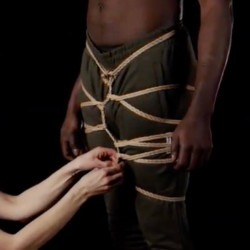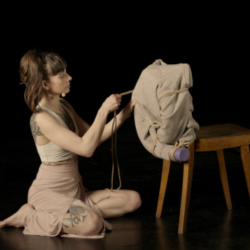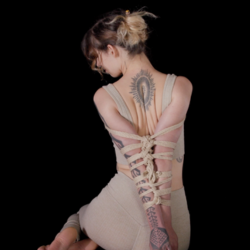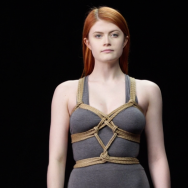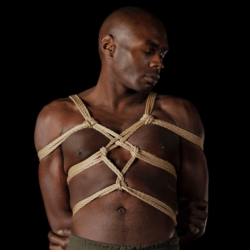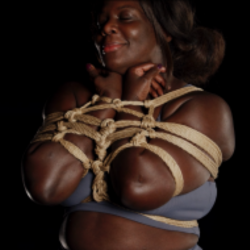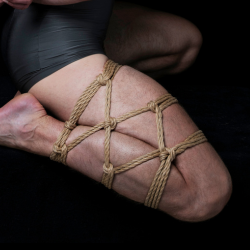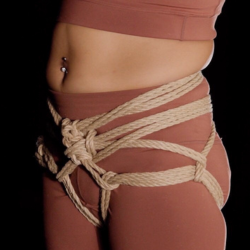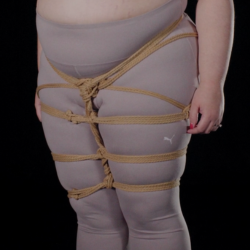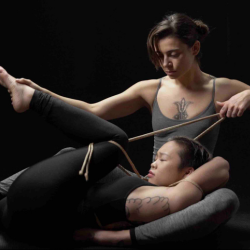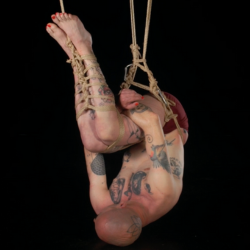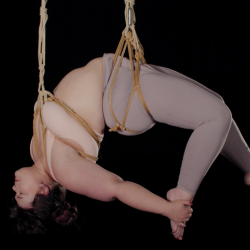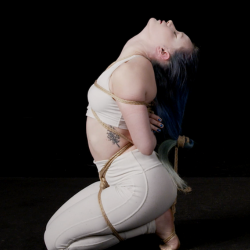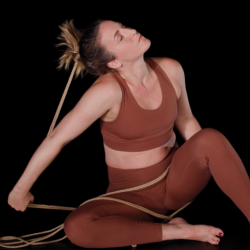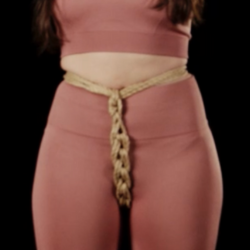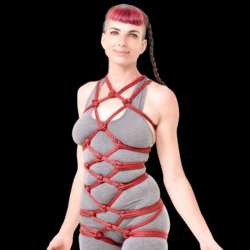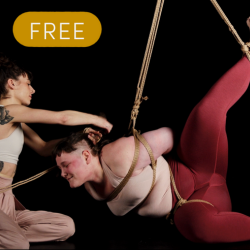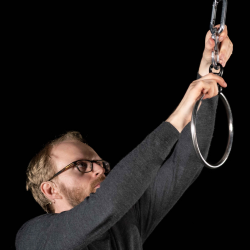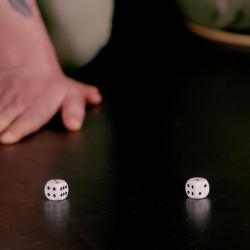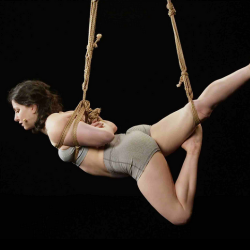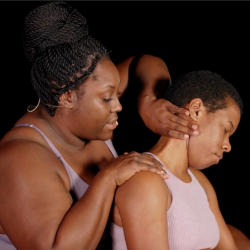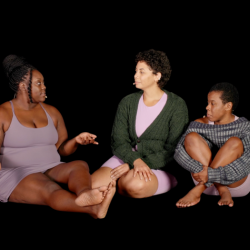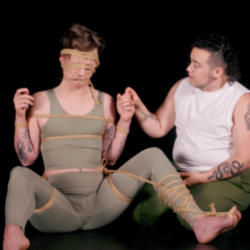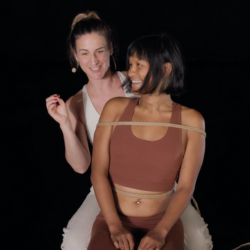EP 31
MALACHI
Malachi, a switch in kink practices, emphasizes safety, negotiation, and self-advocacy in BDSM. They discuss rope experiences, nerve checks, and body perception, highlighting the emotional significance of self-suspension and the role of photography in self-discovery.

Malachi (they/them) is a trans-identified, kinky, queer, polyamorous writer, and educator with a bachelor’s degree in traditional mathematics.
Their literary work has been published in several journals including The Rhapsodist and Gertrude, and they have presented their work at the University of North Carolina Asheville Queer Conference. In their mathematics career, they published and presented several pieces in the field of mathematical biology, including papers discussing the dynamics of HIV modeling and the impact of harm reduction techniques on intravenous drug using populations.
Malachi has been active in the Baltimore kink scene since 2014. They are also staff on several larger events, including Dark Odyssey (Manager on Duty) and logistics team for TESFest. They have been an educator for the past ten years, focusing on queer and trans identities, safer sex and sexual agency, and introduction to kink and non-monogamy. They are passionate about intersectionality, consent, and risk-awareness, both inside and out of the kink scene.
Instagram: https://www.instagram.com/monomaniacism/
Twitter: https://twitter.com/monomaniacism/
[00:00:07] Wicked Wren Hello folks, and welcome to the Shibari Study Podcast. I'm your host, Wicked Wren. Shibari Study is an online learning resource offering video tutorials for beginners through advanced practitioners. Whether you're brand new to the world of Shibari and needing to learn the basics, or a seasoned rigger or rope bottom seeking inspiration to push your practice to new places, there's something for you at shibaristudy.com. Today I'm talking with Malachi. Malachi uses they/them pronouns. They're a switch in the Baltimore area and a self-described lazy rope top. You said you like to inflict the most amount of pain with the least amount of effort. Which I thought was just really funny.
[00:00:55] Malachi Yep. That's me.
[00:00:57] Wicked Wren How are you?
[00:00:58] Malachi I'm good. Tired, but good.
[00:01:00] I love that. And you're tired because you just got back from the rock climbing gym, right?
[00:01:04] Malachi Yeah. I decided that I really needed to go bouldering before we had this discussion, so that is what I did.
[00:01:10] Wicked Wren Very good. I feel like the amount of people that are into rope and rock climbing... Very, uh, common thing.
[00:01:18] Malachi I joke a lot that the intersection, like, if you could make a Venn diagram between rope people and rock climbers and yoga people, it would be more of a pancake. Because we are really kind of all together. I've actually met people at the rope share that we have in Baltimore. I've seen people there that have started coming that I knew from the gym, so that's always funny.
[00:01:37] Wicked Wren Oh, cool. That's awesome. Yeah. Do you do yoga as well?
[00:01:42] Malachi Uh...I dabble. When I can remember to do it. I'm very bad at remembering to do it.
[00:01:48] Wicked Wren It's one of those things that I really, really want to do, but I never do.
[00:01:53] Malachi Yeah, I get into it for a little while, and then I have a day where I'm feeling off and don't do it. And then I kind of fall out of the habit. And then it's been six months.
[00:02:00] Wicked Wren Exactly. Exactly. You also have a lot of ferrets.
[00:02:05] Malachi I do. I have four ferrets, and I can talk about them for hours.
[00:02:09] Wicked Wren It's a lot of ferrets.
[00:02:10] Malachi It is. They're great. I have two boys and two girls, and one is a really fancy ferret. It's like a privately bred, half Angora, 20% European polecat, fancy boy named Goblin.
[00:02:24] Wicked Wren Oh my God. Are they all friends?
[00:02:29] Malachi They are. They all sleep in one big cage together. And we kind of joke that, like, because they kind of sleep-- they have a ton of beds, but they all kind of sleep in a puddle. So it's just sort of like a liquefied ferret with some paws and noses sticking out. But you can't really tell what is what.
[00:02:46] Wicked Wren Is that what they do in the wild?
[00:02:49] Malachi I think in the wild polecats are a little more independent. But they do snuggle.
[00:02:54] Wicked Wren What is a polecat?
[00:02:56] Malachi A polecat is what you think of when you think of a ferret. It's just a wild ferret. It's what ferrets are bred from.
[00:03:03] Wicked Wren I haven't seen ferrets in the wild.
[00:03:06] Malachi So they are in cold areas. A lot come from Russia and Eastern Europe. And yeah, they're European polecats, so they are... Actually, fun fact: European polecats are more closely related to domestic ferrets than the black footed ferret, which is in North America.
[00:03:23] Wicked Wren Oh my God. You know so much about ferrets.
[00:03:26] Malachi It's a little silly.
[00:03:27] Wicked Wren Maybe the polecats should vacation to Southern California or something.
[00:03:32] Malachi They should, except they don't do well with heat. They do really well in cold areas, so... alas.
[00:03:36] Wicked Wren Well... Wow. I don't do well with heat either.
[00:03:41] Malachi I don't do well with humidity. I like the heat. Humidity is what sucks for me.
[00:03:44] Wicked Wren I grew up in New Orleans, so... Super familiar with the humidity. It is not fun.
[00:03:51] Malachi That is a level.
[00:03:52] Wicked Wren You were saying that you're third generation queer?
[00:03:57] Malachi Yes. So I was born in the late 80s to a lesbian couple. Not artificial insemination. My biological mother got pregnant in a what would be considered traditional way. And my biological father, I've never met, you know, kind of a hit and run guy. My parents met and raised me and my sister for 18 years. They were together. And then they ended up separating and now have each remarried. But so that's sort of one generation. And then within that family group, one of my moms ended up going to seminary and is a queer minister. And so a lot of the elders that she met through her seminary's journey and a lot of the members of the church that I grew up in were people who had been around and part of queer movements since like the 40s and 50s and 60s. So I have this sort of wealth of oral knowledge and history of my grandparents generation. So we say I'm third generation queer because I just had these different levels of history that I've been passed down, and it's really cool. And I also have a 14, almost 15 year old that I'm like... She gets so sick of me regurgitating history all the time, but I'm raising the fourth generation, so it's kind of fun.
[00:05:18] Wicked Wren That's absolutely incredible. That's such a not a common story.
[00:05:23] Malachi No and I feel really lucky to have it. Yeah.
[00:05:30] Wicked Wren Do your parents know that you're (…)?
[00:05:34] Malachi Yes. Actually, both of them do.
[00:05:37] Are they (…)?
[00:05:38] No. So one of my... My birth mother and I actually don't talk very much anymore. She's very... I don't know if this reference will be understood, but she's very sort of second wave feminist. Not super happy about me being trans, so we don't talk very much anymore. But the mom that I'm the closest to, she knows I'm (…). She is not. She knows that I go to camp events and whatever part of her initial seminary training. Because the church she was preaching in was a queer church. So part of what they did for up and coming clergy is had to do some desensitizing training. So, like, your congregation is going to be gay leather men and, you know, whatever, all sorts of different things. Right? And so you had to be able to counsel and talk to people in your congregation and not be shocked or like, not show shock or disgust. So they did a lot of work around desensitizing the ministers to be able to talk about, like, weird, (…), queer (…).
[00:06:44] Wicked Wren I never thought about that word, 'desensitizing'. It's like exposing someone to something new. I never thought about that.
[00:06:50] Malachi Yep. And so they would literally sometimes have to watch (…). Or something just to be like, get your reactions out now so that when your person comes in to the office to talk to you about this, you're not like grossed out at them and it's causing more harm.
[00:07:04] Wicked Wren Yeah.
[00:07:05] Malachi Yeah.
[00:07:06] Wicked Wren It's wild because I hear that you grew up in a queer family, and I just think about how incredible it is. But you're talking about all these intersectional issues and all these things that... Like your birth mom being second wave feminist and not really loving that you're trans and things like that.
[00:07:22] Malachi Yeah.
[00:07:23] Wicked Wren Wild. How did you find (…)?
[00:07:27] Malachi Oh, wow. Um...
[00:07:28] Wicked Wren Well, let me ask this first, actually. When did you come out as queer?
[00:07:32] Malachi So it's funny, because I was very heterosexual. I was obnoxiously heterosexual for like, all of middle school and the beginning of high school. And then I was in the band, and at that point I was still passing as female, and there was this really hot drummer girl, and, oh no, suddenly I was bisexual.
[00:07:49] Wicked Wren Did you play saxophone or something?
[00:07:51] Malachi I did not, I played French horn, but I was a drum major.
[00:07:53] Wicked Wren It's the same thing. Oh, well, listen, this is all...
[00:07:56] Malachi I'm going to drop a fun nugget for you. I was actually on MTV for it, when I was in high school, for having gay parents and also for being drum major, as like, student conductor. But anyway, so I had my first girlfriends in high school, and then, kind of became the token lesbian of my high school. Except I had a boyfriend at some point, so that was also really weird. B ut, yeah, I've been out as some form of queer since, like, my early teens, 12-13 came out as gender queer, like 14.
[00:08:27] Wicked Wren Was it easy to come out?
[00:08:30] Malachi I think it was harder to come out to myself than it was to anybody else. You know, and back then I think, you know, this was the like late 90s, early 2000. I think it was difficult because my parents, we were, you know, supposed to be the ideal American gay family. Right? So, it didn't really do much for the gay people raised gay kids argument because then I ended being queer, my sister ended up being queer. So, I think there was some pressure to be very heteronormative or at least homonormative to some degree? That made it a little more difficult at that point.
[00:09:07] Wicked Wren What a wild thing to think about. The fact that your family is queer, and there's still this cis-het narrative that's being pushed on you, and that pressure is still there. It's like... Being the perfect queer family. Like, two freak parents can raise a normal kid. You know, that's the idea that's being pushed.
[00:09:30] Malachi Yep. And by the way, I do think that that could, I guess, happen, but it did not happen in our case. Yeah, no. The perfectionism follows you, like the need to be absolutely perfect and above reproach.
[00:09:43] Wicked Wren Oh, of course. You're under a microscope.
[00:09:47] Malachi Yeah. Always.
[00:09:48] Wicked Wren The thoughts here that you and your sister came out as queer. Do you think that more people are queer and just don't have a way to talk about that?
[00:09:59] Malachi I think.. I think that it was especially when we were growing up, that was very true. It was the extremes that had the ability to come out or people who had access to language. Now... Again, I have an almost 15 year old, and I feel like the generations coming out now doesn't assume heterosexism in the same way that I feel like we did. And so I think that the idea of coming out has actually really shifted dramatically to where people don't come out because it's assumed that you might be queer. Yeah.
[00:10:30] Wicked Wren Yeah, I think that is pretty cool. I am really jealous and also happy for the younger generation.
[00:10:39] Malachi Yeah. I do a lot of the like, "Oh, I'm so glad you're able to do this". But also, "Do you know what we had to go through!?" Like, I'm very much a curmudgeon sometimes. I think that's the piece of the conversation that doesn't get talked about. Is that like being trans doesn't mean you have to transition. But if you transition, that doesn't mean that it is a fix all for everything, right? And that's been true.
[00:11:00] Wicked Wren Yeah. So when did you find (…) world?
[00:11:04] Malachi When I was five. I mean I do have memories from when I was a child of exploring... Like, in trying to figure out your body or whatever. I would steal the knives from my kitchen and, you know, whatever. See how they felt. It was great. But actually, as an adult, I was dating someone when I was 19 who was like, "Oh, you should go look at this conference that's happening in DC." And it was WinterFire. And I was like, "Oh my God, that's really expensive." Because I was 19 and didn't understand how things functioned. And so that was one of my first like, "this is a thing that exists". And then, a few years later I went to Trans Camp out, which was my first event that I ever went to. And that's kind of where I started to meet (…) folks. And then I started to explore what (…) was like outside of just doing (…). And the idea of non-sexual (…) and (…) community. So that was 2013? Something like that. About ten years ago.
[00:12:16] Wicked Wren Speaking of finding the (…) scene, people that you can talk to and express stuff, something that you were talking about before we started recording was consent and how that's kind of a big deal for you. What are your general hang ups around how we talk about consent right now?
[00:12:33] Malachi Okay. I have so many. I used to write a lot about this, and I haven't been doing that as much lately, but, I... I think consent is really nuanced and complicated and all the things, and I think that first of all-- I mean, ok, I think a lot of things. One is that there is a transition period that happens from entering mainstream world into (…) world, where the rules are very different. I am not saying that it shouldn't be like that everywhere. We should have much more consent focused culture everywhere. But the reality is we do not live in a consent culture. And so when you come into the (…) world, there is a period of learning. And part of learning is screwing up. What I'm saying is not that it is okay for people to go around violating consent. What I am saying is that there needs to be a little bit more of a grace or a way to talk about how people coming in and the learning curve, and how do you really navigate that, like when people aren't used to asking things all the time. How do you normalize that? Um..
[00:13:32] People will mess up.
[00:13:34] Yeah, people will mess up. And like that doesn't make it okay. But it also doesn't make them a villain right off either. And so kind of navigating that piece of things. And then the big thing that I kind of like yell about all the time is that I... I think that we treat consent like a tool. Like a tool out of the toolbox. You know, we can pull out our consent, we can pull out our negotiation, we can pull out like, these different things. And I don't think that framework is helpful. I think that if we think of consent more as the muscle that operates the tool, then it becomes a lot more natural and feels less clunky. And so, you just sort of function in the world as somebody with a consent orientation. And so when you're at the coffee shop, you're like thinking about your proximity to the person in front of you. And like, it just makes you more self-aware and also aware of your surroundings. And then it makes integrating consent into your play and your day to day life a lot more fluid and natural. So consent is not an isolated thing. It is sort of the structure that we use to do everything else.
[00:14:38] Wicked Wren Yeah. A lens that you view--
[00:14:41] Malachi Yeah.
[00:14:41] Wicked Wren --Life through. In your analogy, if consent is the muscle, what are some of the tools?
[00:14:49] Malachi The tools can be communication. And the way that we communicate and that we negotiate. It can be practice, it can be going to classes, learning things, being willing to say, we don't know. Again, it's it's our own body awareness. You know, how aware we are of ourselves, is its own kind of tool. Particularly when we're in rope and we're doing a lot of body movement and interaction. The way that our bodies are interacting with another body is its own kind of tool. To create whatever atmosphere.
[00:15:20] Wicked Wren You said feeling safe to say, 'we don't know'. Why do you think it's so hard for people to say they don't know?
[00:15:27] Malachi Well, you're asking the person that grew up as a perfectionist. And not knowing was a weakness. It's a sign that you have somehow failed or that you... Aren't everything people think that you are, right? And especially, I think in the rope world it can be... I think because rope can be such a daunting thing to even start picking up and trying to learn, at some point you get enough knowledge that you feel competent, and then you realize there's so much you don't know and you're so tired of not knowing, that you just want to go do the fun thing. So it's hard to say. I don't know how to do that.
[00:16:03] Wicked Wren Learning really comes in waves with it.
[00:16:05] Malachi Yeah it does. It really does.
[00:16:08] Wicked Wren Yeah. In the beginning you feel like you know everything and then you know nothing, and then you think you know everything again. Then you know nothing. It's funny how that goes.
[00:16:16] Malachi And then you know, you realize you have just enough knowledge to hurt somebody and not enough knowledge on how to fix it. Yeah.
[00:16:23] Wicked Wren Yes, yes. And a lot of times you think back at all the stuff that you used to do and you're like, "Oh, wait, that was actually really not great".
[00:16:29] Malachi I can't stand looking-- Like in first year of tying. I came into tying very, very fast. I was a little bit of a wrecking ball into the rope scene in some ways, just because I picked it up and I hyper fixated on it like any person with ADHD does. And that's all I did, for months and months and months. And I think that, you know, my rope in the very, very beginning was not, like, not horrendously unsafe. But, God, I look back on it and I'm like, 'Oh, baby, what were you doing, honey? No no no no no no no no no.'
[00:17:01] Wicked Wren Why do you think so many people on rope do that? Because it's very common. Everyone says that they come in a rope and they go 0 to 100 immediately.
[00:17:10] Malachi Because I don't really know how else you could do it. I think that the the learning curve is so steep. God knows I tried to come into rope a couple of times, and when I just kind of casually practiced it, like, you know, I would play around single column for a day or two and then just kind of drop it. And so you lose your knowledge. You never cement the knowledge. But like, in order to really get that muscle memory so that you can then drop it and then come back, you kind of have to have obsessed over it for a while.
[00:17:38] Wicked Wren Yeah. Do you think people downplay the amount of work that goes into it? The time commitment? The time expense?
[00:17:44] Malachi Yes and no. I think that it's a balance, right? Where like... I think there is... Because it's such a-- it seems like such an accessible thing, I think the risks are often downplayed. But, it's a weird sort of gatekeepy thing when people are like, "Okay, but this is going to take a lot of time and be really hard. Are you sure you want to?". Like, that piece of it doesn't feel super great either. And so I think finding that balance of, what is it you're wanting to do? Like what is your entry point? How can we get you to that thing so you can actually have fun and then figure out where to go from there?
[00:18:18] Wicked Wren You just said a lot of great things. And you talked about gatekeeping, which we haven't talked very much on this podcast about. And I think coupled with the idea of saying, 'Where do you want to go? And what do you really want to do?' is hard. Because in the beginning we see pictures of people being suspended and we're like, that is really cool, and I want to do that. But in the beginning, you can't really do it. And there has to be a secondary emotion that you want. Do you want to make that person feel something, or do you want to make them look hot and feel empowered or feel shame? Let's dig in into gatekeeping a bit.
[00:18:55] Malachi I think it is a lot better than it was. And certainly like I have been incredibly fortunate. The way that I came into the community was ーlike as a person that was tyingー was surrounded by a group of other queer folks. There was a rope share, it was the queer femme rope share, qfrs. And we met up once a month at a Baltimore based rope person's home and did like a skill share style. And so that actually felt really... Antithesis of gatekeeping, I guess. And so I guess to talk about gatekeeping, I have to talk about the ways that I see it being combated. I have been incredibly fortunate to be able to attend classes or intensives or workshops at, like some kind of discounted rate or being able to pay for it in working or doing other things, because I don't have the finances. And I think that that's the biggest piece. The biggest barrier to entry with rope to me is money, because it's an expensive hobby. And after money, it's access to education and so... You know, gatekeeping can look like only being willing to tie certain types of people or not being able to see your body represented as a rope bottom, or as a rigger or whatever. But it can also look like just not having the social network connections, financial resources, whatever to be able to access the education you need.
[00:20:24] Wicked Wren Yes. Yes. The time able to put in to learn it, too. It's also a huge thing people don't talk about. Coming into the world as a queer trans person and learning rope and seeing bottoms and stuff like that. Did you feel... Represented? I guess? As a good way? How did you feel?
[00:20:45] Malachi Oh, God. I have such a complicated history with that, because... It's funny because the way I felt at the time and retrospectively looking back on those things and having a much better context for that, I feel differently now. I think at the time, I felt like I was struggling to find people who wanted to put rope on my body because I wasn't a tiny, cute, petite, femme presenting person. And I think that there's some validity to that. But I also... Am more aware now of what it is like as a top and comfort with someone else's body, or comfort in what you know how to tie.
[00:21:19] Wicked Wren And is that what you're saying: there's validity in that? Because that's what tops generally learned how to tie.
[00:21:26] Malachi I think that is some of that. And I also think that I was a kind of entitled little brat to some degree. I'm not entitled to rope like... And that's part of why I started tying, it's because I wanted to be in rope. But I realized that I didn't like this feeling of.... Feeling like I needed to either be beholden to someone, or that I was entitled to someone else's time, energy and rope. Like, that didn't feel good. And so, you know, I think there is some truth to that narrative of not being that, you know, tiny, skinny, petite, whatever. I also think that especially in Baltimore, there's rope generations. And I just kind of came in between generations. And so I didn't really have the same cohort of, like, rope family that I was learning from. And then... Yeah, I also again came in to it with a bunch of other queer and trans folks. And so, in ways, it was a very insular introduction and that I could like, see other trans and queer people tying. And had, you know, seen other like, not just cis white dudes tying. But I could also name every single one of them for a while. You know, because there were only five kind of thing. So that's its own piece. Um... Yeah.
[00:22:41] Wicked Wren You said that you learned how to tie. What was-- had you always been a switch in all the things?
[00:22:47] Malachi I am a switch. I joked I am a 24/7 switch. I don't switch for everything that I do. The other joke was that I used to say I could never bottom for myself, and then I would self tie. But, like, I used to do lots of impact. I used to do lots of knife play, needle stuff, now rope stuff. And I don't switch with all of it. It really depends on the person. But I was always a switch. I came into rope as a bottom and was very, very lucky. And the first time I was suspended, had a really awesome experience with a rigger who goes by the name Skylark now, Sky. And is also an educator who sat me down and had a very long conversation with me about, like, safety and risk and I still use and most of the things that they taught me to this day. And so I feel very fortunate that I came in with a person who was actively like, "I want to make sure that you feel empowered and safe as a bottom to take care of yourself."
[00:23:51] Wicked Wren Can you tell us some of those things that you learned?
[00:23:54] Malachi They were talking to me about, like a TK and box ties and how to do my own nerve checks, motorcycle hands and doing the finger, um, checking my fingers. Make sure that my nerves were okay. And talking about nerve versus circulation and some of those wrist things. But like, the way that they were explaining it made me feel like as a bottom, I had some control in being able to advocate for what I needed. And they made it really safe to advocate for things or tell them what was going on. So that was awesome.
[00:24:23] Wicked Wren That is a weird thing where you have to feel safe to advocate for yourself. You have to feel like you can advocate for yourself.
[00:24:31] Malachi Yep. You know, and I think all of us who've been around the (…) scene long enough have our own ways of establishing play partners. But one of my things is that, if you aren't comfortable setting your boundaries when we negotiate, then we can't play, because I don't trust you to advocate for yourself. I don't trust you not to do something that doesn't feel safe or comfortable for you because you think I'm hot or you don't want to interrupt something like, I need to know that you can advocate for yourself.
[00:25:01] Wicked Wren It can be as simple as you drove a long way. Yeah, it could be as simple as you took time off from work.
[00:25:09] Malachi Yep. But I mean anything. Yeah. Like, I need to know that you're not just going to go along with whatever we say is okay.
[00:25:16] Wicked Wren Talk to me about your negotiations. How do you structure that?
[00:25:21] Malachi It depends on what I'm negotiating for. But if I'm negotiating for rope, for example, I like to get a sense of how comfortable familiar is the other person with rope and also rope community. Have they ever been in a rope before? What do they like about it? What are they trying to get out of this experience? I negotiate photographs as an independent thing, and I negotiate (…) as an independent thing. So I always address both of those things. Like, if we're at an event where there's a photography policy, then, no. But like, if I'm tying at my house before we're in rope I'm like, "Hey, if I want to take a picture of any of this, is that okay? Yes/No." And then I also am always like, because most of my rope is not (…), and so I say that I'm like, I'm not trying to... Do a (…) at you. You know, with the understanding that we're putting rope on bodies and sometimes if I have to put rope around your thigh, I might be very close to, like, your (…) area. But I'm not attempting to arouse or, you know, like, kind of having some of those very, just point blank discussions. yeah.
[00:26:22] Wicked Wren How does the camera play a role in your sessions?
[00:26:26] Malachi Camera? I mean, not often, I don't like... Doing rope for the photo. Unless we're trying to do a specific shape or image or create something. I'm not a photographer.
[00:26:38] Wicked Wren Do you find that it adds? Do you think that like that.. That adds at all or...?
[00:26:43] Malachi I do, in some cases. So for me when I would self tie, I would also self shoot because I have really bad body, like, dysmorphia. And I don't really understand how my body moves through space. And so the pictures would help me understand how to connect a sensation that was happening in my body with the visual image of what it look like. So in those ways, I think it did add something for me.
[00:27:10] Wicked Wren And did that help? Did that accomplish that goal?
[00:27:16] Malachi It did. Because I think it helped me bridge that line of like, what does my body feel like it's doing? Or what do I picture it's doing and what is it actually doing? And at least brought those closer together.
[00:27:28] Wicked Wren I don't think it's a uniquely trans experience, but I do think that it's very common in trans people to not really understand what their body looks like from the outside. Because... We generally change our bodies a lot, and we're generally happy about some things but not others. And I understand this is a human experience, but I think with trans people it's it's a little bit more evident because generally there's something that's really changing... Some team if you will.
[00:27:59] Malachi Yeah. No. Exactly. And I know for me, one of the things I like about being in rope is that it's-- like, in someone else's rope, not for self suspending, but like when I'm rope bottoming, is that for whatever period of time that we are engaging in this, I don't have to control what my body is doing. I don't have to think about how my body's moving in space. Am I being friendly? Am I being welcoming? Am I being open? Like, how am I presenting myself to other people? Am I approachable? I don't have to worry about that at all. It's great. Yeah.
[00:28:29] Wicked Wren Speaking of your body, you were hypermobile, right?
[00:28:34] Malachi I have some hypermobility in my shoulders. Yeah. And some in my hips.
[00:28:40] Wicked Wren I read something that you wore jeans when you self-suspended.
[00:28:46] Malachi Yes. So, one of the things that I had to start doing when I was self-suspending all the time, is I kept leaning into flexibility, which is, you know, great, because I would do these really cool, flexy looking things, but it actually was causing me some damage to, like, my hips and my knees. And so I would start wearing jeans to build up more core strength and not have the ability to be as flexible or lean into my flexibility. So it was sort of a forced restriction piece. That was really helpful. But yeah, I used to get picked on because I would wear jeans in photos with rope.
[00:29:21] Wicked Wren It's amazing. I mean, I think jeans are cool. I think it's kind of hot.
[00:29:26] Malachi Today I wear stretchy jeans, so I don't know if that would accomplish the same purpose.
[00:29:31] Wicked Wren I would see people that had some degree of hypermobility and I am the opposite. I am a very, very tight person in general, and I would kind of hurt myself a lot in the beginning because I wanted to be that flexey. I wanted to be that... I don't know. This goes back to our yoga conversation saying, I really wish I could have done yoga and I've always done it, but I don't get-- I can't put my heels down in downward dog stuff like that. I'm just a very, very, very tight human.
[00:30:02] Malachi I think as someone that started tying people, I actually really like, the people-- like I don't feel like flexibility makes a good rope bottom.
[00:30:10] Wicked Wren I don't think that it makes-- I don't think it's like a tenet that people should say, "I'm flexible. So I'm a good rope bottom." I don't think that those things... That does not equal good rope bottom. And I believe that that's an item that is told to people. It's easy to think about that. Because athletic people are flexible, all these kinds of things.
[00:30:33] Malachi I mean, I think that people also mistake flexibility for strength.
[00:30:36] Wicked Wren Yeah.
[00:30:37] Malachi And what they see as flexibility is actually like, a lot of muscular strength. They just make it look easy.
[00:30:46] Wicked Wren Exactly. It's also a long game to learn those things. I have kind of a weird question for you, but the single-column is the first thing that we all learn. And it's kind of put out there like it's a beginner thing and we learn it and then we forget about it and we move on to the bigger stuff. But you were saying that a single-column is not only a beginner tool.
[00:31:08] Malachi I really don't think it is. And I know that I've sat in intensives and lectures and for like the first four hours of the day, did nothing but tie single columns. And I think that my experience has been-- from the rope share that we run in Baltimore-- is that like like, "Okay, cool. Yeah, I learned this. Now what?" And trying to really stress, like, no, this is important. The tension is really important. You can do a lot with a single-column. If your tension is good. You can do a lot with this very basic thing. And so I think that that's something we kind of go back to... Practicing over and over and over again and so, yes, it's a good beginner tool, but it's not just for beginners. I don't think.
[00:31:45] Wicked Wren That makes sense. I think that--
[00:31:47] Malachi I also do a lot of single column suspensions, so like... Yeah.
[00:31:51] Wicked Wren Why do you do single column suspension so much?
[00:31:54] Malachi Well, partially because I'm a self-suspender and we're all idiots. And I say that with absolute love and affection for all of my other self suspenders out there. And I'm lazy. I want to get up fast.
[00:32:06] Wicked Wren I love it. I love it, and that's the easiest way to do it.
[00:32:10] Malachi That is. It works a lot!
[00:32:11] Wicked Wren When you self-suspend, do you do some kind of hands free chest harness as well? Or no?
[00:32:18] Malachi I think I'm supposed to say yes to that.
[00:32:20] Wicked Wren You don't have to. You can say whatever you want.
[00:32:22] Malachi I would say that safety wise, it's always good to have some sort of a chest line of some sort, and most of the time I try to give myself a version of that. But I don't like tying chest harnesses on myself. I don't like chest compression, and so I would rather tie... So when I tie myself, it's a lot of like, a single column on my thigh, a single column on the waist, and maybe one of my foot. And then I flip around and dance around a lot and then come back to the ground. And then, yeah, a lot of that.
[00:32:52] Wicked Wren What emotion are you going for when you're self suspending?
[00:32:56] Malachi Oh God, that super depends. Sometimes I just feel very dissociated and want to be back in my body. And so I will, you know, tie something fast and just sink into it. Sometimes I am hurting somewhere, and the rope can be really nice to just-- almost like an inversion table-- just flip upside down and hang out. Usually though, I like to dance. I like to move. I used to do drag, I, guess I rock climb now, I like anything really that feels like movement. And so that's kind of what I'm going for most of the time. If that makes sense.
[00:33:33] Wicked Wren What do you have coming up that you're excited about?
[00:33:37] Malachi Ooh. Um... I know that summer camp's coming up, although I won't be able to be there this year. Actually, honestly, right now the thing that I'm most excited about is I'm doing a bunch of job interviews, so I'm excited to, like, I finished my graduate program. So then I'll do a master's degree.
[00:33:53] Wicked Wren What did you study?
[00:33:55] Malachi Social work and public health. So I, uh, have a degree in social policy and epidemiology, and so it's just been the, you know, interviews and job process. So I'm actually just excited for that piece to be moving forward. And then I think I've referenced that like six times. So we have a rope share in Baltimore that's once a month. And that has been probably one of the coolest things. It's a skill share. And it's so queer. I love it. Like... it's not explicitly anything, it's not explicitly queer or anything, but I have I have noticed that people who are very cis, het, white normative, not particularly intersectional in their rope, don't tend to hang out very long. And that's fine. There's a million other spaces where people can go and just do that.
[00:34:45] Wicked Wren If people wanted to get connected with you or the Baltimore rope share, how would they do that?
[00:34:50] Malachi FL is probably easiest. It is malachi with underscore is on either side.
[00:34:55] Wicked Wren Got it. Awesome. Well, thank you so much for being on the podcast.
[00:34:59] Malachi Thank you so much. This was a lot of fun.
Start your free 7-day trial
Get one free week of unlimited access at Shibari Study,
then pay from $17.90/month. Cancel anytime.


